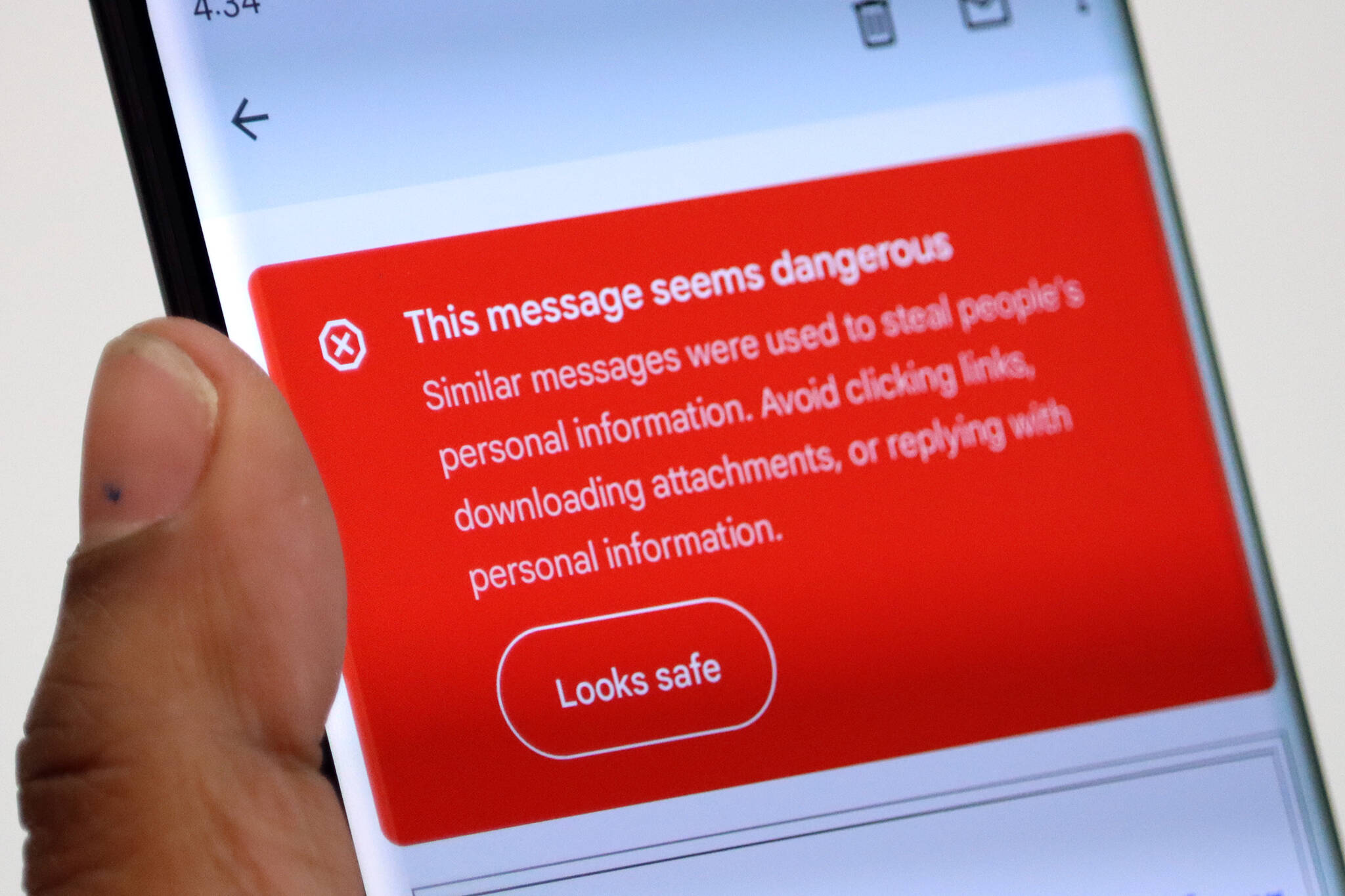Last year saw a spike in cybercrime, according to the FBI, as the rate of cases targeting citizens, businesses and government organizations continues heading upward, striking certain countries and age groups the hardest.
Two weeks ago, cyberattacks from groups associated with the Democratic People’s Republic of Korea stole more than $600 million in cryptocurrency to generate revenue for the dictatorship, according to the FBI.
Most regular people won’t face that kind of crime. In Alaska, the numbers last year weren’t as bad as in some other states, but Juneau residents can ensure their security further with a few simple measures, said Sgt. Matt DuBois of the Juneau Police Department’s investigations division.
First notification that a Juneau resident has been a victim of a cybercrime can come in a variety of ways, DuBois said, but reporting it rapidly to the JPD or FBI quickly can help prevent the situation from getting worse.
“They can come in different ways. Some could come in from a patrol officer,” DuBois said. “As far as frauds and identity theft, they come in in all different forms. We’ll have a detective assigned to that case.”
[Police say drugs were found inside suspect arrested at airport]
According to the IC3 report, the most losses nationwide in a single category of cybercrime were from business email compromise and email account compromise with $2.4 billion in losses, followed by investment scams. The trends of what cybercrimes are popular change in waves, DuBois said.
The U.S. has more reported victims to cybercrimes than the next 20 countries combined at 466,501 reported in 2021, according to the FBI. Of the rest of the world that the FBI has information on, only the United Kingdom comes even close, with 303,949 reported in 2021.
“Because it’s online, it’s often outside of our jurisdiction. It’s on the internet and these people can be difficult to track down,” DuBois said. “A lot of time we refer that to the FBI. Nowadays, there’s so many different ways for people to disguise who they are and where they’re at. There’s ways to block their IP addresses. There’s lots of ways to hide their online identity.”
Often, in these cases, JPD will push the information to the FBI, whose reach is broader and who has a larger database, where the information may help to lead to an arrest. California had the largest number of victims and losses of any American state or territory, according to the report, while American Samoa had the lowest numbers of both. American Samoa has a population of just under 50,000 total, according to the U.S. Census, likely contributing to the low number of victims.
“The people who are actually doing this are little fish,” DuBois said. “(The FBI) might be able to connect the dots.”
Elderly people, 60 years of age and older, had both the highest numbers of reported crimes against them nationwide and the highest financial losses, at over $1.68 billion. The next oldest category, citizens aged 50-59, had the second highest losses at $1.26 billion. Losses decreased with each younger age category.
“The majority of times, not all the times, but often, the victims are elderly people,” DuBois said.
There are four kinds of common scams that often get reported, DuBois said. Tech support scams, where scammers pose as tech support reps offering to fix fake technology issues for a fee, government scams, where scammers pose as law enforcement officials or IRS employees, family scams, where scammers pose as a friend or relative in dire financial need, or sweepstakes scams, where scammers pretend the victim has won a contest, which can be collected for a fee.
“They’ll go find these elderly people and they’ll do all this research,” DuBois said. “They’ll get a legit grandson’s name and they’ll know all about them.”
DuBois said JPD is working to teach Juneau residents how to avoid these kinds of scams.
“We have fliers made up here. We’re trying to work with some of the stores. Another (common scam) is where they call and tell people to buy all these gift cards,” DuBois said. “A lot of our cashiers are aware of this as well. They’ll ask, are these 30 Visa cards for your grandkids?”
Gift cards and cryptocurrency can never be used to pay legitimate bills, legal fees, bail or any taxes, according to a JPD flier. Legitimate industries will also not require that they be paid in cash, as opposed to electronic forms of payment.
Other suggestions for hardening one’s self against possible scams include:
— Never give out personal information like bank accounts or wire transfer information, or leave it accessible. “The bank should never ask you for that,” DuBois said. Criminals can do things like open up credit cards in one’s name, if they have enough of the necessary information.
— If something’s too good to be true, it likely is. “Be cautious of phone calls or emails that are too good to be true,” DuBois said.
— Some good habits online can also save a world of inconvenience, DuBois said. “Change your passwords. Use your privacy settings,” DuBois said. “Don’t keep your credit card saved. As much of a pain as it is, it’s safer to enter it every time and not keep it saved.”
— Certain companies also seem to have tougher security than others, DuBois said; a little research when shopping can help lead to a more secure future.
Scams and other cybercrimes can be reported to at at www.juneaupolice.com or to the FBI at www.Ic3.gov.
• Contact reporter Michael S. Lockett at (757) 621-1197 or mlockett@juneauempire.com.

